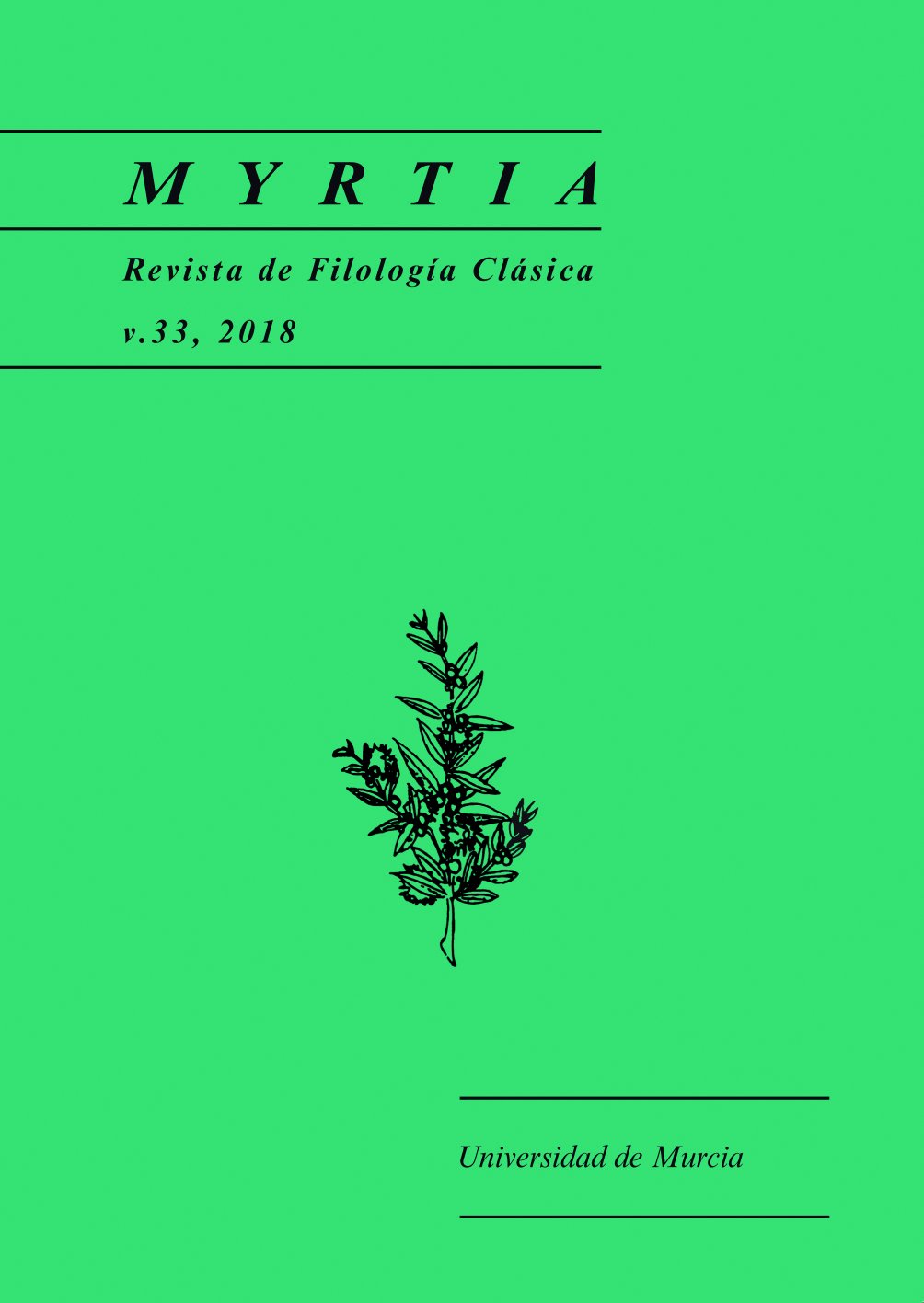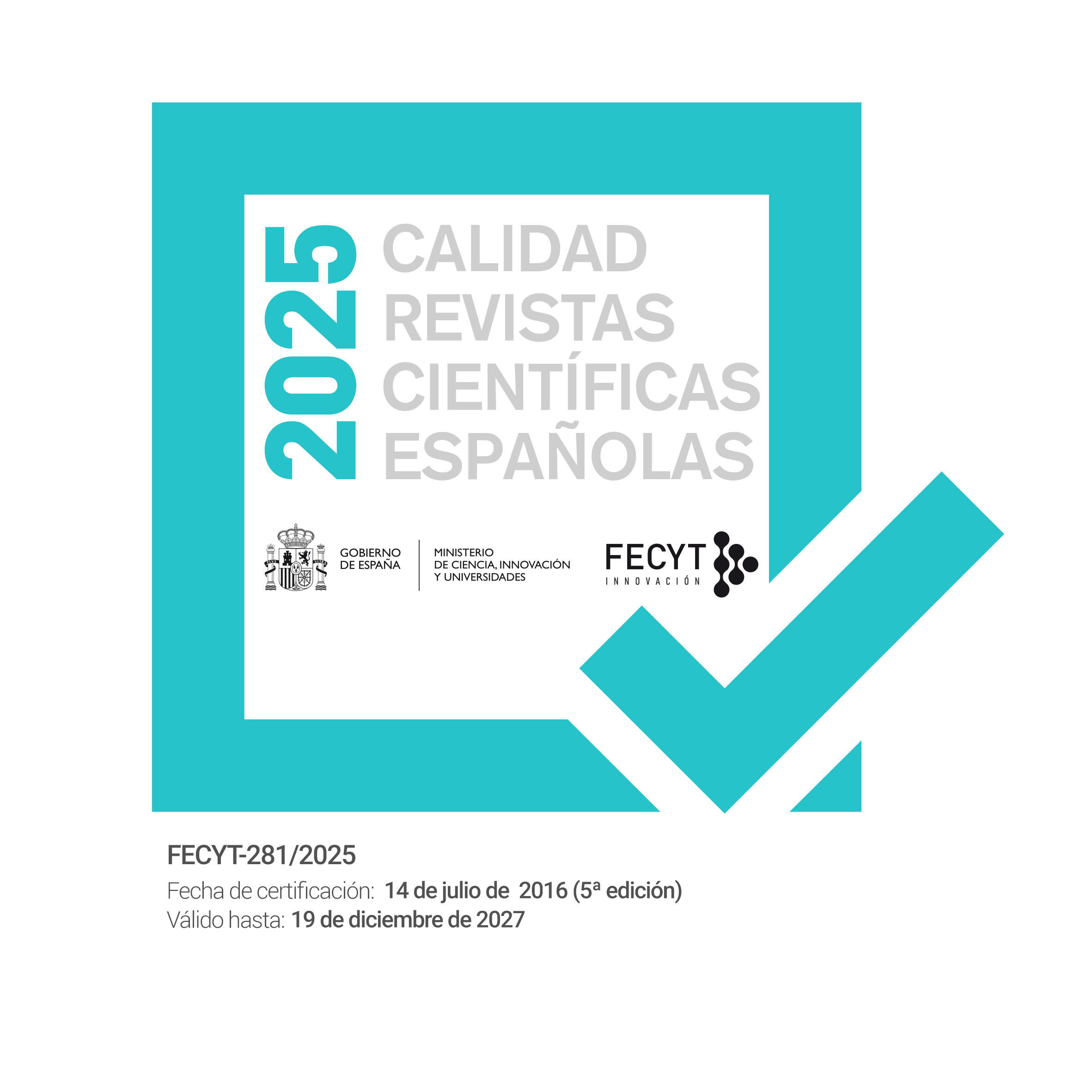The last ten books of Polybius’ Histories
Supporting Agencies
- Estudio realizado al amparo del proyecto FFI2016-75632-P.
Abstract
The last books of Polybius’ Histories are analyzed from a literary perspective. The passages with authoritative content and their characteristic features are studied in the context of the historiographical tradition. The results of the analysis show that the last ten books share objectives with the rest of his works, and at the same time, they point to the fact that a greater variety of literary resources is used, especially in the study of the characters, where reminiscences from Herodotus and Thucydides can be observed.
Downloads
-
Abstract477
-
PDF (Español (España))352
References
A. E. ASTIN, 1978, Cato the Censor, Oxford.
P. U. BOISSEVAIN, 1906, Excerpta de sententiis, edidit P. U. Boissevain, Berlin.
T. BÜTTNER-WOBST, 1906, Excerpta de virtutibus et vitiis, pars prima, edidit T. Büttner-Wobst, Berlin.
J. M. CANDAU, 2003, “Polibio como historiador helenístico. Su actitud frente a la historiografía contemporánea”, en Polibio y la Península ibérica, J. Santos Yanguas y E. Torregaray Pagola (eds.), Vitoria, pp. 51-67.
L. CANFORA, 1972, Totalità e selezione nella storiografia classica, Bari.
C. B. CHAMPION, 2004, Cultural politics in Polybius’s Histories, Berkeley.
T. J. CORNELL, 2013, “M. Porcius Cato” en The Fragments of the Roman Historians, Volume I, Introduction, T. J. Cornell (ed.), Oxford, pp. 191-218.
T. J. CORNELL, 2013a, “M. Porcius Cato”, en The Fragments of the Roman Historians, Volume III, Commentary, T. J. Cornell (ed.), Oxford, pp. 63-159.
P. CUGUSI, y M. T. SBLENDORIO-CUGUSI, 2001, Opere di Marco Porcio Catone, a cura di Paolo Cugusi e Maria Teresa Sblendorio Cugusi, volume primo, Torino.
P. CUGUSI y M. T. SBLENDORIO-CUGUSI, 2001a, Opere di Marco Porcio Catone, a cura di Paolo Cugusi e Maria Teresa Sblendorio Cugusi, volume secondo, Torino.
O. CUNTZ, 1902, Polybius und sein Werk, Leipzig.
J. DEININGER, 2013, “Die Tyche in der pragmatischen Geschichtsschreibung des Polybios”, en Polybios und seine Historien, V. Grieb y C. Koehn, (eds.), Stuttgart, pp. 71-112.
A. DÍAZ TEJERA, 1968, “Análisis de los manuscritos polibianos Vaticanus Gr. 1005 y Vindobonensis Gr 59 y de sus aportaciones al libro I de las Historias”, Emerita 36, pp. 121-147
A. DÍAZ TEJERA, 1983, “Aportaciones del Manuscrito Vaticanus Gr 1005 (Z)los libros II y III de las Historias de Polibio”, Habis 14, pp. 17-32.
A. M. ECKSTEIN, 1995, Moral vision in the Histories of Polybius, Berkeley-London.
A. M. ECKSTEIN, 1997, “Physis and nomos: Polybius, the Romans and Cato the Elder”, en Hellenistic Constructs. Essays in Culture, History and Historiography, P. Cartledge, P. Garsney y E. Gruen (eds.), Berkeley-London, pp. 175-198.
H. ERBSE, 1957, “Zur Entstehung des polybianischen Geschichtswerkes”, Philologus 101, pp. 157-179.
A. ERSKINE, 2012, “Polybius among the Romans: life in the Cyclops’ cave” en Imperialism, Cultural politics and Polybius, C. Smith, y L. M. Yarrow (eds.), Oxford, pp. 17-32.
J.-L. FERRARY, 1988, Philhellénisme et imperialisme. Aspects idéologiques de la conquête romaine du monde hellénistique, Roma.
J.-L. FERRARY, 2003, “Le jugement de Polybe sur la domination romaine: état de la question”, en Polibio y la Península ibérica, J. Santos Yanguas y E. Torregaray Pagola (eds.), Vitoria, pp. 15-32.
M. GELZER, 1956, Über die Arbeitweise des Polybios, Heidelberg.
M. GELZER, 1964, “Die pragmatische Geschichtsschreibung des Polybios”, en Kleine Schriften III, H. Strasburger y C. Meier (eds.), Stuttgart, pp. 155-163 (=Festschrift für Carl Weickert, G. Bruns (ed.), Berlin, 1955, pp. 87-91).
M. GIGANTE, 1951, “La crisi di Polibio”, PP 5, pp. 33-53.
P. GOUKOWSKY, 2012, Diodore de Sicile, Bibliothèque historique, fragments, tome III, livres XXVII-XXXII, texte établi, traduit et commenté par P. Goukowsky, Paris.
E. S. GRUEN, 1992, Culture and National Identity in Republican Rome, New York.
C. HABICHT, 1956, “Uber die Kriege zwischen Pergamon und Bithynien”, Hermes 84, pp. 90-110.
L. I. HAU, 2016, Moral History from Herodotus to Diodorus Siculus, Edinburgh.
R. HERCOD, 1902, La conception de l’Histoire dans Polybe, Lausanne.
M. ISNARDI, 1955, “Τέχνη e ἦθος nella metodologia storiografica di Polibio”, SCO 3, pp. 102-110.
W. KIERDORF, 1980, “Cato «Origines» und die Anfänge der römischen Geschichtsschreibung”, Chiron 10, pp. 205-224.
G. A. LEHMANN, 1974, “Polybios und die ältere und zeitgenössische griechische Geschichtsschreibung. Einige Bemerkungen”, en Polybe, neuf exposés suivis de discussions, E. Gabba (ed.), Genève, pp. 145-200.
K. LORENZ, 1931, Untersuchungen zum Geschichtswerk des Polybios, Stuttgart.
J. MARINCOLA, 1997, Authority and Tradition in Ancient Historiography, Cambridge.
B. MCGING, 2010, Polybius’ Histories, Oxford.
B. MCGING, 2012, “Polybius and Herodotus”, en Imperialism, Cultural politics and Polybius, C. Smith, y L. M. Yarrow (eds.), Oxford, pp. 22-49.
A. MEHL, 2013, “Geschichte in Fortsetzung: wie, warum und wozu haben Autoren wie Polybios und Thukydides/Xenophon auf ein Ziel hin geschriebene Geschichtsswerke fortgesetzt?”, en Polybios und seine Historien, V. Grieb y C.
Koehn, (eds.), Stuttgart, pp. 25-48.
B. MEISSNER, 1986, “Πραγματικὴ ἱστορία: Polybios über den Zweck pragmatischer Geschichtsschreibung”, Saeculum 37, pp. 313-351.
N. MILTSIOS, 2013, The Shaping of narrative in Polybius, Berlin-Boston.
E. MIONI, 1949, Polibio, Padova.
S. MOHM, 1977, Untersuchungen zu den historiographischen Anschauungen des Polybios, Saarbrücken.
A. MOMIGLIANO, 1984, “Polibio, Posidonio y el imperialismo romano”, en A. Momigliano, La historiografía griega, Barcelona, pp. 226-238 (= AAT 107, 1972-1973, pp. 693-707).
J. M. MOORE, 1965, The manuscript tradition of Polybius, Cambridge.
C. NICOLET, 1974, “Polybe et les institutions romaines” en Polybe, neuf exposés suivis de discussions, E. Gabba (ed.), Genève, pp. 207-258.
P. PÉDECH, 1964, La méthode historique de Polybe, Paris.
K.-E. PETZOLD, 1969, Studien zur Methode des Polybios und zu ihre historischen Auswertung, München.
S. PITTIA, 20052, Denys d’Halicarnasse, Rome et la conquête de l’Italie aux IVe et IIIes. avant J.-C., Antiquités romaines, livres 14-20, textes traduits et commentés sous la direction de S. Pittia, Paris.
A. J. POMEROY, 1991, The appropriate Comment. Death Notices in Ancient Historians, Frankfurt am Main.
T. ROOD, “Polybius, Thucydides and the first Punic War”, en Imperialism, Cultural politics and Polybius, C. Smith, y L. M. Yarrow (eds.), Oxford, pp. 50-67.
A. ROVERI, 1964, Studi su Polibio, Bologna.
K. SACKS, 1981, Polybius on the Writing of History, Berkley-London.
R. VON SCALA, 1890, Die Studien des Polybios, Stuttgart.
G. SCHEPENS, 1974, “The bipartite and tripartite divisions of History in Polybius (XII 25e & 27), AncSoc 5, pp. 277-287.
H. H. SCULLARD, 1945, “Charops and Roman policy in Epirus”, JRS 35, pp. 58-64.
B. SHIMRON, 1979-1980, “Polybius on Rome. A reexamination of the Evidence”, SCI 5, pp. 94-117.
W. SIEGFRIED, 1928, Studien zur geschichtlichen Anschauung des Polybios, Berlin.
K. SVOBODA, 1913, “Die Abfassungszeit des Geschichtswerkes des Polybios” Philologus 72, pp. 465-483.
E. THOMMEN, 1885, “Über die Abfassungszeit der Geschichten des Polybios”, Hermes 20, pp. 196-236.
M. TREU, 1954, “Biographie und Historie bei Polybios”, Historia 3, pp. 219-228.
P. VEYNE, 1996, “Décrets latins de consolation et date de l’édition de Polybe”, en Splendidissima Civitas, études d’Histoire romaine en hommage à François Jacques, A. Chastagnol, S. Demougin y C. Lepelley (eds.), Paris, pp. 273-280.
F. W. WALBANK, 1970, A historical commentary on Polybius, Volume I, Commentary on books I-VI, Oxford.
F. W. WALBANK, 1972, Polybius, Berkeley-London.
F. W. WALBANK, 1974, “Polybius between Greece and Rome”, en Polybe, neuf exposés suivis de discussions, E. Gabba (ed.), Genève, pp. 1-31.
F. W. WALBANK, 1979, A historical commentary on Polybius, Volume III, Commentary on books XIX-XL, Oxford.
F. W. WALBANK, 1985, “Polybius last ten books”, en Selected Papers. Studies in Greek and Roman History and Historiography, F. W. Walbank (ed.), Cambridge, pp. 325-343 (= Historiographia Antiqua: commentationes Lovanienses in honorem W. Peremans septuagenarii editae, Leuven, 1977, pp. 139-162).
F. W. WALBANK, 1985a, “Political morality and the friends of Scipio”, en Selected Papers. Studies in Greek and Roman History and Historiography, F.W. Walbank (ed.), Cambridge, pp. 157-180 (= JRS 55, 1965, pp. 1-16).
F. W. WALBANK, 2002, “Polybian studies, c. 1975-2000”, en F. W. Walbank, Polybius, Rome and the Hellenistic World. Essays and Reflections, Cambridge,
pp. 1-27.
F. W. WALBANK, 2002a, “The Geography of Polybius”, en Polybius, Rome and the Hellenistic World. Essays and Reflections, F. W. Walbank (ed.), Cambridge,
pp. 31-52 (= C&M 9, 1948, pp. 152-182).
F. W. WALBANK, 2002b, “Polybius and the Past”, en F. W. Walbank, Polybius, Rome and the Hellenistic World. Essays and Reflections, F. W. Walbank (ed.),
Cambridge, pp. 178-192 (= Tria Lustra, Essays and Notes presented to J. Pinsent, H. D. Jocelyn (ed.), Liverpool, 1993, pp. 15-23).
F. W. WALBANK, 2002c, “Polybius’ Perception of the one and the many”, en F. W. Walbank, Polybius, Rome and the Hellenistic World. Essays and Reflections, F. W. Walbank (ed.), Cambridge, pp. 212-230 (= Leaders and Masses in the Roman World, I. Malkin y Z. Rubinsohn (eds.) 1995, pp. 201-222).
R. WEIL, 1988, “La composition de l’histoire de Polybe”, JS 3, pp. 185-206.
H. D. WESTLAKE, 1968, Individuals in Thucydides, Cambridge.
C. WUNDERER, 1890, Sprichwörter und sprichwörtlische Redensarten bei Polybios, Wiesbaden.
K. ZIEGLER, 1952, “Polybios”, RE XXI 2, cols. 1440-1578.
Las obras que se publican en esta revista están sujetas a los siguientes términos:
1. El Servicio de Publicaciones de la Universidad de Murcia (la editorial) conserva los derechos patrimoniales (copyright) de las obras publicadas, y favorece y permite la reutilización de las mismas bajo la licencia de uso indicada en el punto 2.
2. Las obras se publican en la edición electrónica de la revista bajo una licencia Creative Commons Reconocimiento-NoComercial-SinObraDerivada 3.0 España (texto legal). Se pueden copiar, usar, difundir, transmitir y exponer públicamente, siempre que: i) se cite la autoría y la fuente original de su publicación (revista, editorial y URL de la obra); ii) no se usen para fines comerciales; iii) se mencione la existencia y especificaciones de esta licencia de uso.
3. Condiciones de auto-archivo. Se permite y se anima a los autores a difundir electrónicamente las versiones pre-print (versión antes de ser evaluada) y/o post-print (versión evaluada y aceptada para su publicación) de sus obras antes de su publicación, ya que favorece su circulación y difusión más temprana y con ello un posible aumento en su citación y alcance entre la comunidad académica. Color RoMEO: verde.






